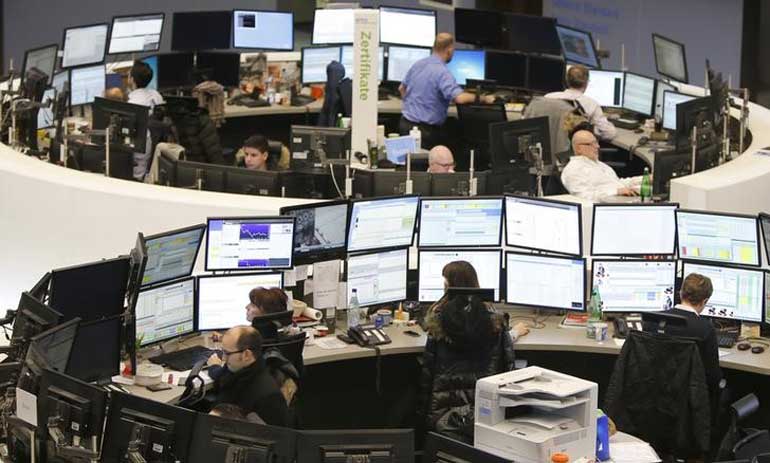Thursday Feb 19, 2026
Thursday Feb 19, 2026
Thursday, 15 October 2015 00:00 - - {{hitsCtrl.values.hits}}

World shares fell for a second day running and the dollar dropped to its lowest in almost a month on Wednesday following new signs of a slowdown in China’s economy.
Limp inflation figures from China, volatility in other major emerging markets and more falls in commodities dampened buying.
MSCI’s 45-country All World stock index was down 0.4% at 400.24 points after a near 2% drop by Japan’s Nikkei had lead Asia lower and as the pan European FTSEurofirst 300 opened roughly 1% in the red. The dollar fell to its lowest in almost a month against other main currencies on bets the uncertainty will prevent a rise in U.S. interest rates, oil slipped again while safe-haven gold notched a fourth day of gains.
In Europe, eyes were on Portugal after talks to form a new government had broken down in Lisbon on Tuesday.
Caretaker Prime Minister Pedro Passos Coelho, whose centre-right grouping won the Oct. 4 election but lost its parliamentary majority, failed to obtain backing from Socialist Party leader Antonio Costa.
Portugal’s bond yields rose, defying a broader debt market rally and though Lisbon stocks were up slightly on day they have shed over 5 percent so far this week and some bank stocks are down as much as 16 percent.
Brent oil retreated towards $49 a barrel as the International Energy Agency has indicated the oil glut will persist through next year. Industrial metals prices were all lower.
Fragile politics are adding to emerging market risks. Brazil’s real dropped about 2% overnight as President Dilma Rousseff accused her opponents of ‘deliberate coup-mongering’ as tensions rose over a federal audit of how deficit numbers were published.
The focus was still mostly on China though and what kind of reaction there will be from authorities there to clearly slowing growth. The country’s authorities are due to announce a new five-year economic plan later this month.
China’s consumer price index (CPI) rose 1.6% in September from a year earlier, the National Bureau of Statistics(NBS) said, falling short of expectations of 1.8% and down from August’s 2.0%.
Earlier in the day, the Monetary Authority of Singapore (MAS) had said that it will ease its monetary policy for the second time this year by slowing the pace of the Singapore dollar’s appreciation. The move was aimed at reviving an economy that narrowly avoided a recession in the third quarter.
MSCI’s broadest index of Asia-Pacific shares outside Japan ended down 0.6%, while Japan’s Nikkei stock index slumped 1.9%.
Chinese shares were also lower, but only just. The blue-chip CSI300 index down 0.9% and the Shanghai Composite Index losing 0.8 percent.
Australian shares also nudged lower, reflecting China’s importance as Australia’s main trading partner. It also came after Wall Street had dropped off a seven-week high.
The U.S. central bank will hold just two more policy meetings in 2015, on Oct. 27-28 and Dec. 15-16, with expectations fading that the Fed will deliver a hike this year.
The yield on benchmark 10-year Treasuries slipped to 2.042% in early European trading while Wall Street futures were pointing to a steady restart.
The dollar index, which tracks the greenback against a basket of six peers, was down about 0.2% as the euro clawed itself back above $1.1411.
LONDON (Reuters): Oil eased further below $50 a barrel on Wednesday, falling for a third day, on concern a supply glut will persist and demand slow down as economic growth moderates in No. 2 consumer China.
Chinese growth for the third quarter is expected to fall below 7% for the first time since the global financial crisis. The International Energy Agency (IEA) said on Tuesday the oil market would remain oversupplied in 2016.
Brent crude was down eight cents at $49.16 a barrel as of 1114 GMT. US crude was up three cents at $46.69.
“Prices should remain low,” said Daniel Ang, an investment analyst at Phillip Futures. “We are still in oversupply.”
The IEA forecast on Tuesday that oil demand growth would slow next year and a potential increase in supply from Iran would counter slowing output from the United States and other countries outside OPEC, keeping the market oversupplied.
The Organization of the Petroleum Exporting Countries in 2014 dropped its longstanding policy of supporting prices by cutting output, choosing instead to defend market share against higher-cost producers such as US shale oil.
In a sign the strategy is working, a forecast from the U.S. Energy Information Administration sees US shale production falling by the most on record in November, extending a nationwide output decline into a seventh month.
“Non-OPEC supply will probably decrease more steeply than previously anticipated,” said Carsten Fritsch, analyst at Commerzbank in Frankfurt. “Shale oil production in the US, for example, is now falling sharply.”
Still, the latest round of weekly US supply reports is likely to suggest no end to the glut is yet in sight.
Analysts expect reports from industry group the American Petroleum Institute (API) and the US Department of Energy (EIA) will show crude stocks rose by 2.9 million barrels.
The API releases its data at 2030 GMT, followed by the EIA on Thursday. OPEC has shown no interest in cutting production to support prices, but cash-strapped member Venezuela has been pushing for the group once again to control output and seek a “floor” for prices at $70.
Venezuelan Oil Minister Eulogio del Pino said on Tuesday eight non-OPEC countries had been invited to attend an Oct. 21 technical meeting of oil experts, which will discuss Venezuela’s suggestion of a price floor.